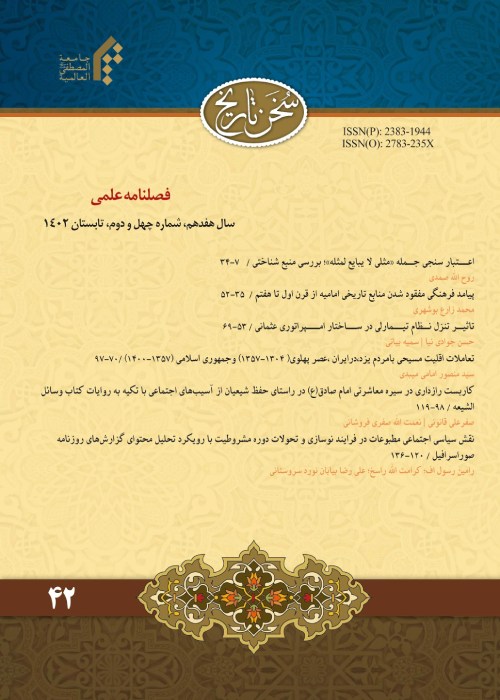Maqrizi relationship with the FatimidsRelative and intellectual contexts in Maghrizi's attention to the history of the Fatimids
The Fatimid government (297, 567 AH) in the continuation of the Ismaili movement and relying on their teachings, was one of the governments trying to revive Shiite influencial works on the ideas of Shiites for 270 years of caliphate. Maghrizi (766, 845 AH) was also one of the famous non-Shiite historians of the Mamluk era (Ayyubids) in the Islamic Maghreb. An era that, despite the brilliance of historiography in that period, did not neglect from enmity with Shiites and Fatimids. After two centuries of his time with the Fatimids, Maghrizi studied the Shiite Fatimids with a non-Shiite thought and in the heavy religious-political atmosphere of the Mamluk era with a sociological view and a civilized approach and evaluated them with the most prudent Islamic state and their period as the most brilliant period of Egyptian rule. Maghrizi's special attention to the history of the Fatimids and his praise of their works and achievements has led researchers to explore the causes and has caused the compilation of works to explain the relationship of Maghrizi with the Fatimids. In the meantime, Nasser Rebat, a professor at MIT University in the field of history and theology, and also the director of the Aga Khan program, Sought to discover this relationship with studying the historical propositions and examination of the political-religious orientations of Maghrizi, using descriptive-analytical methods and found the commonality of that two in the Descent and geography of the unit linking between the Sunni Moroccan historian and the Shiite Fatimid state. A lineage that Maghrizi concealed as a result of the Mamluk government's feud with the Fatimids and appeared as a revolutionary scholar (inclined to Zaheriyah) in the position of criticizing the Mamluks and praising the achievements of the Fatimids and yet, he never showed interest in Fatimid beliefs. The following article is a translation of this valuable study from English to Persian.
Maghrizi , Fatimids , Egypt , lineage , Fatimid lineage
- حق عضویت دریافتی صرف حمایت از نشریات عضو و نگهداری، تکمیل و توسعه مگیران میشود.
- پرداخت حق اشتراک و دانلود مقالات اجازه بازنشر آن در سایر رسانههای چاپی و دیجیتال را به کاربر نمیدهد.


